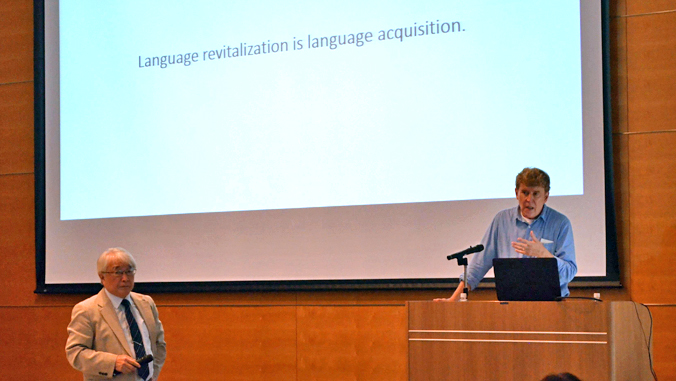
Last spring, the University of Hawaiʻi at Mānoa College of Languages, Linguistics and Literature and Japan’s National Institute for Japanese Language and Linguistics (NINJAL) entered into a partnership to expand endangered language research by sharing resources and conducting joint research endeavors. As a result, NINJAL hosted its first international symposium, which reflected its reach and impact across the globe.
“Approaches to Endangered Languages in Japan and Northeast Asia: Description, Documentation and Revitalization,” was held in Tokyo in August, and included linguistics professors William O’Grady from UH Mānoa and Yumiko Ohara from UH Hilo, who served as keynote speakers. O’Grady’s address emphasized the importance of the role of linguists in language revitalization efforts. Ohara discussed the language revitalization and re-normalizing efforts of Hawaiian.
UH Mānoa Department of East Asian Languages and Literatures (EALL) Associate Professor Shinichiro Fukuda told the symposium audience about the UH and NINJAL partnership publicly for the first time.
The departments of EALL and linguistics are well matched for NINJAL priorities. NINJAL has documented various aspects of the Japanese language across regions and through the ages and today serves as an international locus of extensive studies on the languages of Japan.
The Japanese section of the EALL is the largest in the nation, serving more than 1,000 students each semester, and specializes in language, linguistics and literature. The Department of Linguistics has world-renowned strengths in language documentation and conservation, as well as experimental linguistics.
More about the symposium
The inaugural symposium included speakers from the French National Centre for Scientific Research, University of Helsinki, University of British Columbia, as well as participants representing Japan, South Korea, China, Taiwan, the United States, Canada, Finland and Poland.
A wide-range of activities, including workshops on Hawaiian immersion courses, revitalization research, critically endangered languages and issues faced when working on documentation and revitalization were also a part of the event.

